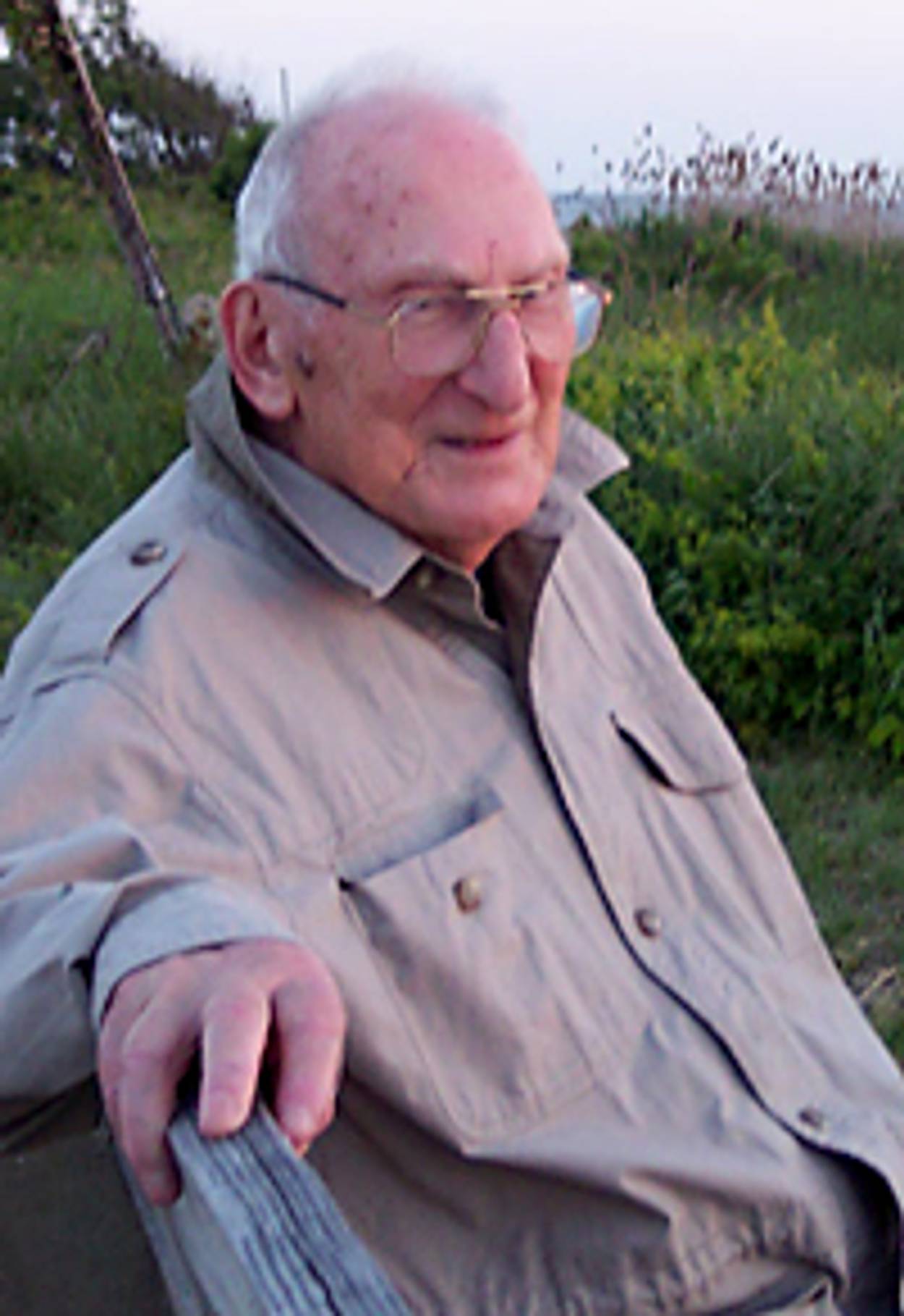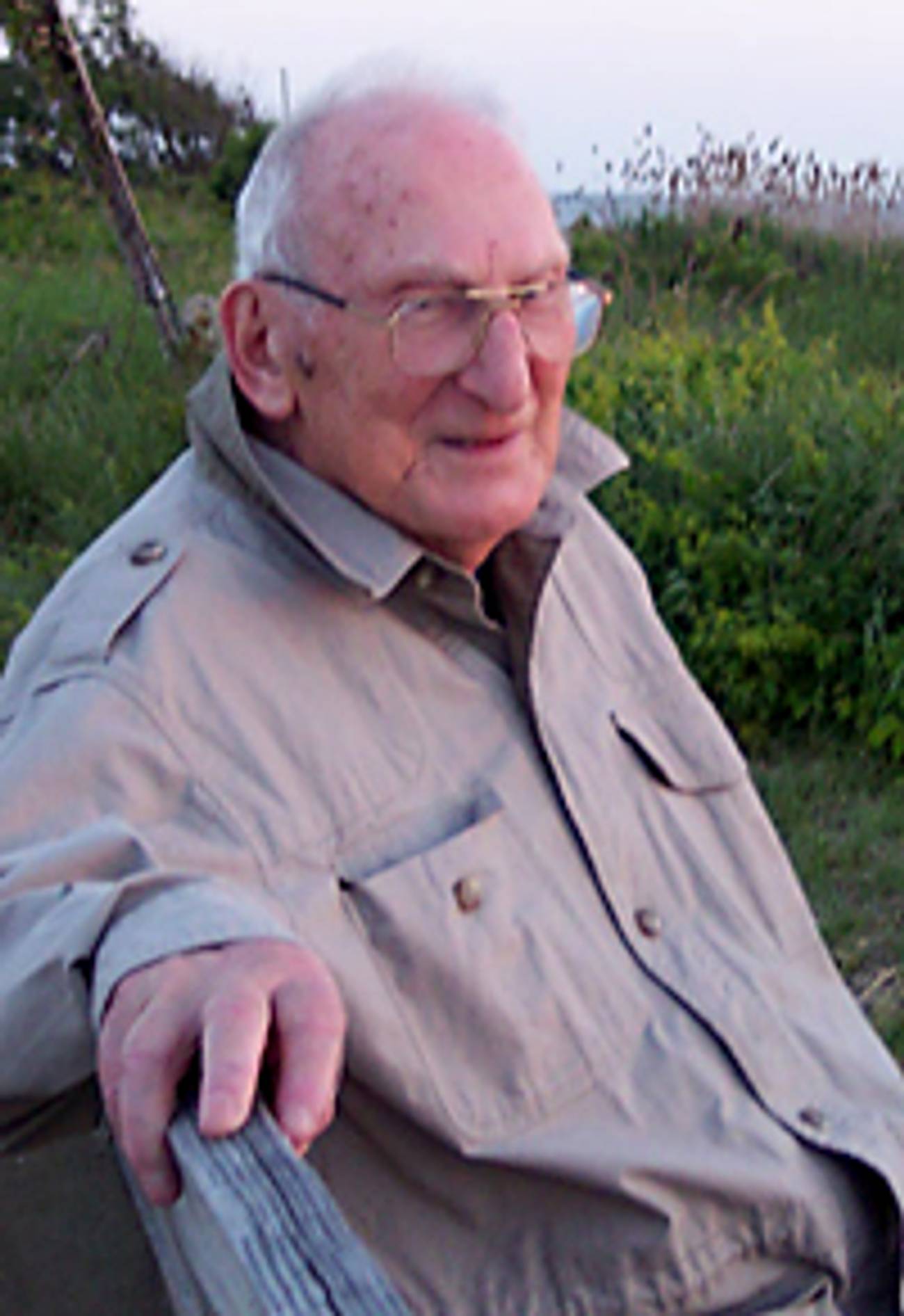Late Bloomer
A nonagenarian gives the memoir thing a go, revisiting his hard-knock Lancashire boyhood




Harry Bernstein’s first book, The Invisible Wall, comes out this April—just weeks before the author’s 97th birthday. A memoir, it looks back more than 80 years to Bernstein’s boyhood in Northern England. There, in a working-class Lancashire mill town, he was raised Orthodox on a street divided by religion. On his side, he played soccer and cricket, made friends, and began to dream of America—until his older sister’s romance with a Christian boy across the way nearly toppled the precarious divide that defined the community.
Told without nostalgia, The Invisible Wall follows Harry’s coming-of-age as the world around him experiences its own growing pains—the first World War, the Russian Revolution, and the brutal years leading up to World War II. In 1922, Harry’s family immigrated to the United States, where he finished school, worked as an editor and journalist, and enjoyed a 67-year marriage. Since the death of his wife in 2002, Bernstein has spent most of his time reminiscing and writing. His next memoir, tentatively titled The Dream, begins where the first memoir leaves off—on the eve of his family’s departure from England.
The Invisible Wall is, ultimately, about the difficulties of being Jewish in England before and during World War I. Today, with the benefit of hindsight, it seems that English Jews actually had an easier time than other European Jews.
Well, yes and no. Jews everywhere during that time were discriminated against. As kids, we were taunted the same way—they always came at us with name-calling and slurs, I never could figure out how they knew we were Jewish! That’s just how it was to be a Jew. The difference, however, between Jews in England and Jews in the rest of Europe, was that Jews in England had the law on their side; they had the British government to protect them. European Jews didn’t have that.
So, the anti-Semitism you’re describing wasn’t limited to your corner of England?
No, it was like that everywhere. All the working-class areas of England were littered with mini-ghettos like ours, streets split down the middle. That was just part of Jewish life. I’m not saying we enjoyed it, but—speaking for my parents and for the other older Jewish residents of the street—it was a place that, after the difficult times in Russia and Poland, after fearing for their lives and running from the Pogroms, was relatively safe, as long as they didn’t stray too far. It really was a refuge. They could go in and out of their houses without being attacked, without being insulted. Even though our little street was split down the middle, dividing Jew from Christian, it still was better than it could have been, and I think we were all conscious of that, even as kids.
Your family emigrated to the United States in 1922. Did you find it very different?
No, that kind of segregation was common in America too, at that time, in the big cities especially. I remember the first time I was on the West Coast, on a bus trip, it must have been 1932 or 1933. I wanted to rent a place in Santa Monica and I was told “Oh, don’t you know they don’t allow Jews to live there?” In the end I found out this wasn’t true, but it made it pretty clear that such segregation wasn’t limited to our little corner of Lancashire.
Despite the hardships your family endured, that little corner of Lancashire comes across in The Invisible Wall as a comfortable sort of place: children played together in the street, women gossiped in your mother’s fruit store.
We felt very much at home on our street. In the surrounding streets there was enmity and a lot of danger for Jews. You came to our street and you felt comfortable. The people across the street—the Christians—were quite a decent lot, at least most of the time. As kids, we spent a good deal of our life on the street, playing our games, the Jews on our side and the Christians on their side. We played soccer and they played soccer. We played cricket and they played cricket. But never together.
Did you feel more Jewish than English?
Yes, but I was young when I left England, just 12, so I don’t know what I would have felt if I had stayed. I suspect that if I had grown into adulthood in England I may have felt just as English as I did end up feeling American. Though I felt much more at home in America than I ever did in England—and part of that may have been that I felt much less Jewish in America. You are given that choice here, to hold on to any identity you choose. My brother, for instance, became very strict Orthodox. My own family is assimilated. We’ve come very close to the non-religious Christians of this country. But you can do that here, and that’s part of what America offers.
If I had stayed in England I would probably still be Orthodox—that’s how we were raised. We ate kosher. We didn’t light fires on the Sabbath. My mother spoke Jewish (Yiddish). I don’t think we would have been able to step outside of that had we not left.
You write that your mother had difficulty adjusting to life in the Bronx. Was that because of this reduced emphasis on Jewishness?
I don’t think my mother suffered because we were less defined as Jews. When you are forced to define yourself as a Jew—as we were in England—it brings you closer to other Jews. You forge a tighter community. My mother lost that when she came to the US and I think that was difficult. But she also gave up a lot of her old prejudices.
For instance, The Invisible Wall is so much about how my older sister fell in love with and married a Christian—and all the trouble that caused, the outrage in the community and our home. Well, the same thing happened when we came to America. Another one of my sisters married a Christian. But it wasn’t an issue—he ended up becoming one of the favorite members of the family. So the fact that we were less conscious of our Jewishness was not entirely a difficulty or a loss.
But it still wasn’t easy, coming to the United States?
Well, we never found the economic prosperity my mother hoped to find by immigrating. The poverty we’d fled pursued us. We never escaped poverty, especially during the Depression. My mother died a sad and broken woman, in a cold flat one winter—we were all there with her, my father was there too, drunk.
The American dream was pretty potent when you were a kid in England?
Yes, we had family in the U.S., my father’s people, who were in New York, working as tailors, like my father was in England. We knew, from them, about electric lights—we didn’t have those in England—and indoor bathrooms, and other amenities. My mother was very pleased with what we had when we came to America and she would often write back to her friends in England and tell them about it. She liked to share how much better off we were in the U.S.
Just as, throughout the memoir, your family in America constantly writes to your mother when she’s still in England, bragging about how well they’re doing?
Yes, the pattern continued. But my mother also longed to go to America because of the independent life she hoped to have there. She had a difficult marriage; my father was always angry, usually drunk, and very sullen. She thought being in another place might improve the marriage. In the end, she was wrong.
That separation between Jews and the Christians is, in many ways, the central focus of the book—your sister’s love story is significant because of the “invisible wall” the lovers cross.
When I sat down to write this memoir—after my wife died, four years ago now—I didn’t know if I would be able to create a long-form narrative of my experience. But, the memories were all there. Alone with my past, as I am these days, I interact with it, discover new meanings in it. One of those new meanings was the potency of the metaphor of the wall—the Berlin Wall, the wall in China, and the wall between Israel and the Palestinians. What I discovered was how my story and my sister’s story fit into this symbolic language. It’s not so much the central metaphor of “my life,” as the central metaphor I discovered while writing about that time in my life.
Was it difficult or painful to recount events that happened so long ago—some of them are more than eight decades old?
I actually found the process quite easy and completely natural. I always wanted to write a novel or a book of nonfiction and only now, in my 90s, did I find a topic and the focus with which I could complete such a project. The writing has been a very good companion. And I’m very proud of the book. Possibly the greatest compliment I have ever received: someone at the publishing house remarked that my writing reminded him of Isaac Singer. I found myself very excited by the idea of my writing fitting into the Jewish American literary tradition. It’s about as much as you can ask for, when you’re a late bloomer.